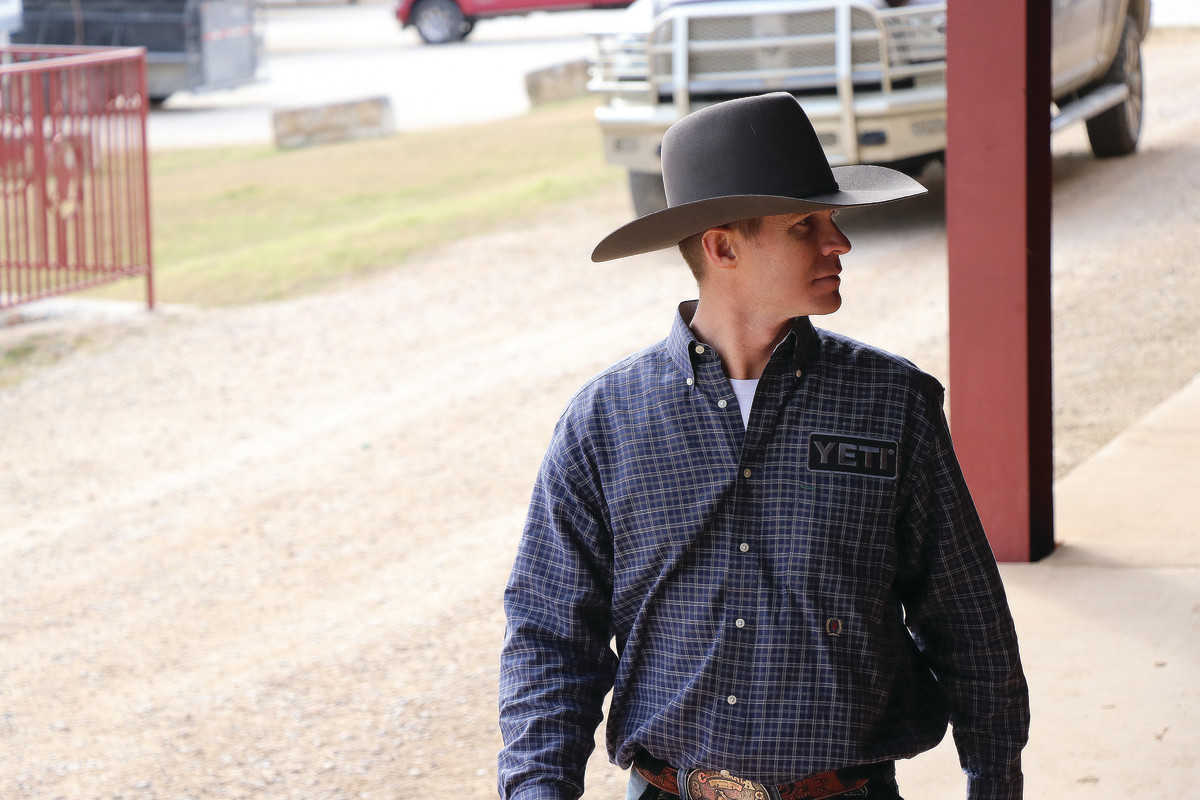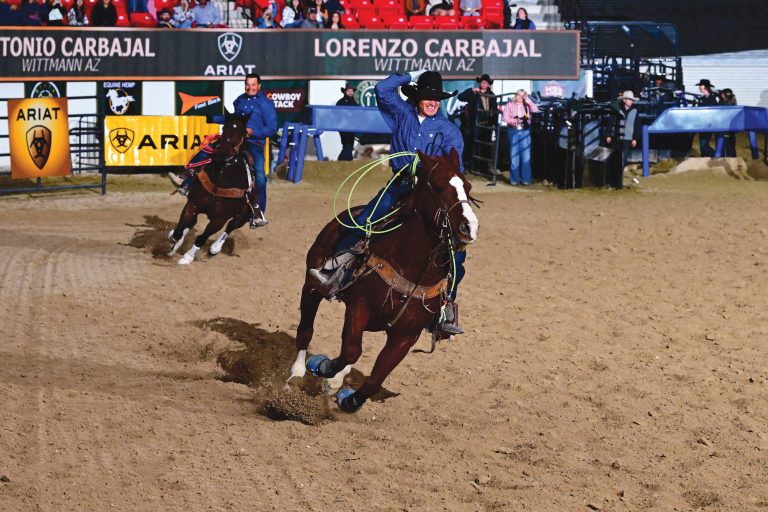Cory Wiese, 40, of Dripping Springs, Texas, is a retired bull rider and steer wrestler turned team roper who spends his work days representing the Yeti brand of coolers and drinkware in the Western industry. Raised in a family that traveled the Western U.S. ministering to young rodeo athletes, Wiese competed in team roping, steer wrestling, and bull riding in high school, college, and ProRodeo before settling down to family life with wife, January, and three kids (Ava, 12; Trip, 9; Grady, 8) in the Texas Hill Country and selecting team roping as his hobby of choice.
Q: Where did your love for the Western industry start?
A: I come from a farm family. My dad rode bulls for 15 years. They lived in Jackson, Wyoming, and farmed rice with his brothers. Then we got an opportunity to buy a sod farm in Louisiana. I got into bull riding after my brother, who was seven years older than me, did. I rode bulls in Little Britches, and my dad bought panels and built a round pen and a bucking chute, and soon we went from four or five kids coming to ride bulls twice a week to over 100 people showing up every week. Dad’s only rule was that you had to show up for Bible study, and you could ride for free. Their ministry was born from that.
Q: That bull-riding Bible study evolved into a way of life for your family.
A: Yes. My dad, Ted Wiese, started doing cowboy church at high school rodeos, and we did the cowboy church at the National High School Finals. I was 11 in 1988, and we decided to move out West. We lived in Nevada in the summer, and wintered in Arizona, and operated Rockin W Rodeo Ministry. Their focus changed about 24 years ago when my mom, Linda, went to culinary school and they started the Cowboy Bistro, and served meals for contestants at a lot of the major rodeos like Houston, Cheyenne, Reno, Pendleton, and the WNFR.
Q: But you were still able to rodeo as a kid, despite the travel?
A: When I was in high school, my dad asked me what state I wanted to high school rodeo in. California was the toughest state, so I went out there. We rented a place outside of Coalinga, California. I made the high school finals in the bull riding from there. I wanted to be out where the tough guys were in college, and at the time the Central Plains and West Texas regions were the toughest. I wanted to get a strong academic experience, and I visited with the rodeo coach at Kansas State, and got a scholarship there. I was team roping and steer wrestling and riding bulls. After my eligibility was up, they asked me if I wanted to help coach. So I was the assistant coach at Kansas State for two years. After that, my parents had moved to Idaho at the time, so I rodeoed in the Wilderness Circuit with my little brother. I rode bulls, team roped, and steer wrestled. I was down south in California and met my wife, January, for the second time. She hated me in high school rodeo, but I had grown up a little bit from that punk-kid bull rider.

Q: How did you end up at Yeti?
A: Yeti has a lady who specializes in market research, and they were looking to get into different communities. Influencer marketing is how Yeti got into this cult following in the hunting and fishing industries. They wanted to replicate that model in different communities. They saw a big market in the Western world, as well as beer and barbeque and the outdoor community. They were wanting to find people in those communities with marketing chops, connections, and authenticity who know how to speak to those communities. I was at my kid’s baseball game, and this lady came up to me, and she said she had heard my background around town in Austin. From the first day, I knew I wanted to be a part of this because the energy is so high. The brand was growing so fast and there was so much buzz around it. Yeti hadn’t done anything in the rodeo space before three years ago when they hired me. They wanted to be sure they were speaking the right language. There are a lot of brands that dip their toes in the water but don’t know how to speak to cowboys. But cowboys can smell bullshit a mile away. I praise Yeti for hiring someone—not just because it was me—to be an authenticity check, internally. Finding the ambassadors out in the space, and signing them on, that’s a blast. Aligning with these associations is a lot of work, but a lot of fun.
Q: How does the team roping industry fit with Yeti?
A: Team ropers are a passionate group of people. They hold 9:00-to-5:00 jobs, but when they get home at night, they’re practicing. They’re going to rope on weekends. They’re beyond passionate enthusiasts. They represent the Western values. They value quality tack, quality horses, quality trucks and trailers. Our product fits in with that. They see our product and know its durable. They value it in their trailers and trucks and cup holders every day. We say our focus, from an ambassador standpoint, is tip of the spear. Derrick Begay, JB Mauney, Luke Branquinho. They’re flying our flag because their iconic. But the members of the USTRC and WSTR are living it every day and using our product every day. Team roping is a no-brainer in my opinion.
Q: When do you find time to rope now?
A: We’ve been sponsoring ropings in Arizona the last two years, so I started roping again there. Before that I haven’t roped in 11 years. I have probably roped eight times since then. This job keeps me pretty busy so roping weekly is daydreaming. If I can get to rope a couple times a month, I’d be happy. I enjoy being at the events and hanging out with my friends. This job is getting me back with my people.
Q: What horses do you have to ride?
A: I have zero horses. We bought 12 acres two years ago, and we’re working on the house, so horses are next. When I go to Arizona, I ride Kami Peterson’s palomino horse, Goose, and then I’ve ridden Dustin Noblitt’s daughter’s horse at the Reno Million, and Barry Berg lets me ride Repoman when we’re in the same spot. I definitely need to get my own horse but it’s nice to fly in and get on a nice one!
Q: What advice do you have for young people who’d like a career in the Western industry?
A: I’ve got a position open for a rodeo specialist with a focus on youth rodeo and barrel racing right now. It says a degree is required, but the right applicant who has the industry knowledge and the connections—networking is a big deal in this industry—would be considered. Getting an internship with one of those brands is ideal. You start building your network even if you’re not getting paid. The bigger your network is with influential people, the better luck you’ll have. That’s everything in our industry—meeting the right people. If you’re not in the industry or haven’t been before, it’s extremely important to get an internship and get under somebody who can show you the ropes. But truly, knowing how to market yourself is number one. If you can’t market yourself, brands won’t be interested in you marketing them.










